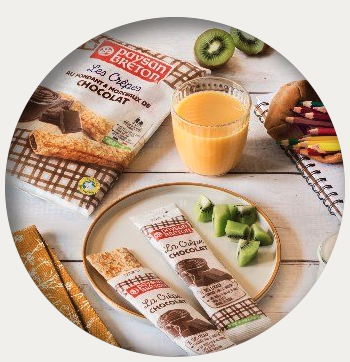
Laïta, one of Western France's leading dairy cooperatives, has successfully collaborated with Walki to develop a mono-material, paper-based secondary packaging solution that meets stringent environmental, technical, and regulatory requirements.
The Challenge: A Sustainable, Recyclable Alternative
“We were looking for a supplier who could improve our current paper-film secondary packaging solution,” explains Mathieu Boulc’h, Packaging Development & Procurement Manager at Laïta. “We wanted a mono-material that was easier to recycle without compromising on the technical and mechanical properties of our packaging.”
Consumer demand for eco-friendly packaging is on the rise, as confirmed by Laïta’s regular market research. Additionally, stringent regulations like France’s AGEC Law, which bans single-use plastics to promote a circular economy, and the EU’s Packaging and Packaging Waste Regulation (PPWR), are driving the cooperative to prioritize recyclable solutions.
However, finding a mono-material that meets all necessary criteria for secondary packaging has been no easy task. “The packaging needs to be cost-effective, compatible with production lines, compliant with current and future regulations, and suitable for marketing purposes,” Boulc’h notes.
Designing Optimal Secondary Packaging for Pancakes
Laïta’s secondary packaging needed to meet specific requirements for their popular snack, French pancakes, or crêpes, typically sold in bundles of six. The material had to balance sturdiness to support the weight of the product with sealability and excellent print quality for branding purposes.
“You need the right balance between paper quality, print finishing, and packaging performance,” explains Marie Barge, Business Development Manager at Walki. Additionally, a material that’s too thick could disrupt production efficiency. “Excellent runnability is critical. Transitioning from a paper-plastic complex to paper should not compromise productivity,” Barge adds.
Walki also addressed Laïta’s sustainability goals by using water-based inks and varnishes to enhance the recyclability of the packaging and maximize fiber yield during recycling.
A Two-Year Collaboration for Success
The partnership between Laïta and Walki spanned over two years, with both teams working closely to overcome challenges and refine the solution. “The project went very well, and Walki met all our needs and expectations,” says Boulc’h. “We maintained an open dialogue throughout the process, resolving every challenge we faced.”
This collaboration has resulted in a fully recyclable, mono-material secondary packaging solution that aligns with Laïta’s commitment to sustainability while maintaining the high technical and aesthetic standards required for their products.
Laïta’s innovative approach, combined with Walki’s expertise, demonstrates how strong partnerships can lead to impactful advancements in sustainable packaging.







